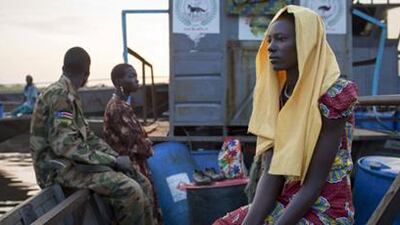Sexual predators are posing as UN peacekeepers in a bid to “get away with” abuse, a UK inquiry into exploitation has heard.
The UK launched its latest investigation into abuse committed by people working in the aid sector in July.
Charities have been under intense scrutiny since 2018 when it emerged that Oxfam staff had paid young women in Haiti for sex while responding to the 2010 earthquake.
Experts have told the UK government’s International Development Committee that aid agencies are still behaving “above the law.”
While giving evidence at the inquiry, experts have called on nations to withhold funding from organisations facing accusations of abuse unless they tackle it seriously.
Professor Andrew MacLeod, who is a visiting professor at Kings College London and the co-founder of Hear Their Cries, told the inquiry "predators" are targeting the aid sector "as they know they can get away with it."
“It is a systematic problem and until a game-changing response is made, nothing will change,” he said.
“There needs to be an academic study into the unreported sex abuse in the aid sector and into how big it is.
“If there is a sexual assault claim, 100 per cent of funding should be withdrawn [from aid groups], unless that is done nothing will change. We will be back here in five, 10, 20 years dealing with this as the United Nations and NGOs believe they are beyond the law.”
He has highlighted the lack of protection for whistleblowers, who have faced losing their jobs as a result.
"The main problem we have is just a sense of impunity."
“Since the whistleblower scandal in Bosnia in 1995, we have seen no real change. There is no whistleblower protection that is in anyway meaningful. The system is set up to punish whistleblowers and shame victims to protect the reputations of agencies before the reputation of victims.
“There is no protection for whistleblowers, they just get crushed, it has to change or victims will just get crushed as well.
“Nothing has changed in the last 30 years and it is really distressing.”
Lawyer Edward Flaherty said the US government withholds 15 per cent of funding to organisations who do not meet best practice and it is something the UK “could consider.”
“In many cases where aid is needed, there is a lack of accountability for the actors,” he said.
“It is getting worse in international organisations.”
Human rights lawyer Sienna Merope-Synge is calling for aid cuts unless agencies properly investigate allegations.
Ms Merope-Synge represents women in Haiti who suffered abuse, and many who were left as single parents after being impregnated by aid workers.
She is calling for the United Nations to pay their child support and reclaim it from the fathers’ nations instead of leaving victims to try and track down the men themselves.
“If survivors want information, they will just get a black hole and if they are lucky will just get crumbs of support,” she said.
The inquiry is considering what progress has been made to protect aid recipients from sexual exploitation and abuse by aid workers and peacekeepers since its 2018 inquiry.
It aims to change the culture of the aid sector to prevent abuses reoccurring and is examining the measures in place for victims to report incidents and the support they have access to.
"I have listened in horror at how the aid sector is targeted by perpetrators of sexual exploitation and abuse," the chairwoman of the International Development Committee, Sarah Champion, said.
"In many cases, extremely vulnerable people are taken advantage of and abused by the very people they trusted to support them.
“The fact that this inquiry is the third piece of work the Committee will have undertaken on sexual exploitation and abuse in two years tells me that this issue continues to rumble on as no one is prepared to challenge the culture that perpetuates it."
Despite a wide-ranging report being published in 2018 issuing numerous recommendations, a follow-up report last year revealed a “lack of progress” in key areas.


